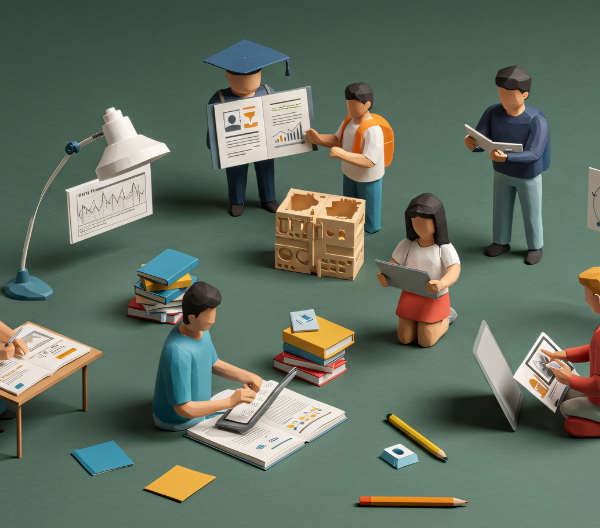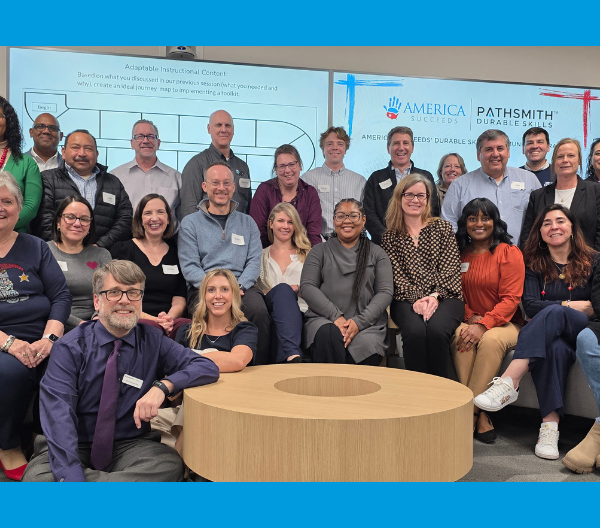This is a guest blog written by Dr. Jane R. Shore, Founder of School of Thought PHL and an advisor on the Research Practice Collaborative.
When the Xerox company realized in the 1990s that they needed to keep pace with fast-moving technological change, they did what many organizations do: they launched formal training initiatives.
They rolled out polished manuals, professional development modules, and retraining sessions for their technicians. But what actually made the biggest difference wasn’t in the scripts or manuals. It was in the back of service trucks and around cafeteria tables. It was peers helping peers, sharing stories, troubleshooting together, offering advice, insights, and encouragement.
Researcher Julian Orr revealed that this “casual chatter” was anything but casual. It was sophisticated knowledge work. It was co-created learning. And it was the kind of experience that didn’t just improve technical skills, it cultivated something more powerful: connection, adaptability, creativity, and empathy. These are the skills that last. These are durable skills.We now understand that what those Xerox technicians were doing is what I’ve been developing in a community that we’ve been calling People-Based Learning (PeBL), a learning orientation grounded in connection, reflection, and action. It isn’t just a pedagogical method; it’s a deeply human approach to how we learn best. Whether in a classroom, a workplace, or a community, PeBL creates opportunities for shared experiences, knowledge, and meaningful human connection.

And in a world shaped by constant change, PeBL may be one of the most powerful engines we have for growing the skills that endure.
That’s why I found the findings from the America Succeeds Research Practice Collaborative (RPC) so affirming. In their new report, Empowering Learners for School, Work, and Life, they share lessons from four trailblazing education programs that have intentionally reimagined how students build durable skills. These programs span urban Philadelphia, suburban Seattle, small-town Missouri, and the outskirts of San Diego, and despite their differences, they converge on a shared truth: learning is most powerful when it’s personal, connected, and applied.
Across all four programs, the RPC team found five foundational practices:
- Interest-driven learning: Students explore their passions through personalized projects.
- Project-based learning: Learning is active, messy, and rooted in solving meaningful problems.
- Real-world engagement: Internships, mentorships, and client work immerse students in authentic challenges.
- Competency-based assessment: Growth is tracked through evidence, not seat time.
- Intentional advising: Trusted adults provide consistent guidance, feedback, and care.
And these programs aren’t just teaching durable skills, they’re creating environments where students live them. It’s learning with and through others. It’s PeBL in action.
Let’s take one example: GO CAPS Monett, a profession-based high school program in rural Missouri. There, students collaborate on real projects with business clients, present their work to industry professionals, and receive mentorship that extends beyond academics. They don’t just talk about communication and problem-solving, they practice it under real pressure, with real consequences. They reflect, revise, adapt, and grow. Just like those Xerox technicians, they’re learning in the flow of real work.
Or consider Building 21 in my hometown of Philadelphia, where students develop competencies in “Habits of Success,” “Wayfinding,” and “NextGen Essential Skills.” These aren’t abstract ideals, they’re part of the school’s daily practice. Students track their progress over time, get coaching from advisors, and engage in exhibitions where they reflect on their learning in public. The school culture is structured around the very same core elements of PeBL: connection, reflection, and purposeful action.
What’s striking is that none of these programs treat durable skills as an add-on. They don’t confine them to a single class or workshop. Instead, they embed them deeply into every part of the student experience. That’s what makes the learning stick. And it’s why students emerge not just with academic credits, but with real readiness for work, life, and citizenship.
The RPC report helps us move beyond theory and into practice. It shows us how these skills are built, and how schools can create ecosystems that nurture them. It shows us that the path to durable skills isn’t paved with worksheets or lectures, it’s paved with People-Based Learning.
And this matters more than ever.
As automation and AI take over more routine tasks, human skills will be our superpower. Machines might handle data, but they can’t replicate empathy. They don’t build trust, spark creativity, or lead with courage. That’s our job.
So how do we create spaces so that students can prepare themselves for this future? We co-create learning that is more human, not less. We build environments where learners feel seen, supported, and challenged. We make room for conversations, for collaboration, for co-creation. We honor the social nature of growth.
That’s what People-Based Learning offers. And that’s what the Research Practice Collaborative confirms.
Let’s reimagine learning not as information transfer, but as a deeply relational process. Let’s build schools and programs that reflect the world we want to live in: connected, reflective, and full of purpose.
Because we don’t just acquire knowledge. We co-create it. And in doing so, we cultivate the very skills that make us most human.
Curious whether your training, learning experience, or program could benefit from a People-Based Learning approach?
Check out this resource to make this concept of People-Based Learning usable
Bio
Dr. Jane R. Shore is a research visualizer with expertise in national and international workforce and training research. She is currently working on a nonfiction book about People-Based Learning (PeBL), which will be published by Routledge in 2026. Her work explores how meaningful, human-centered learning experiences, focused on connection, reflection, and action, can build durable skills and reshape education beyond traditional models. In the last few years, Shore has led the research and development of national durable skills programs, co-founded a place and people based high school, and illustrated Childrens’ books. Her learning organization works across schools and industries called School of Thought PHL to engage in sustained social impact learning projects. You can subscribe and learn more here, in her bi-weekly publication, School of Thought, where you’ll find insights in learning to apply across learning.




